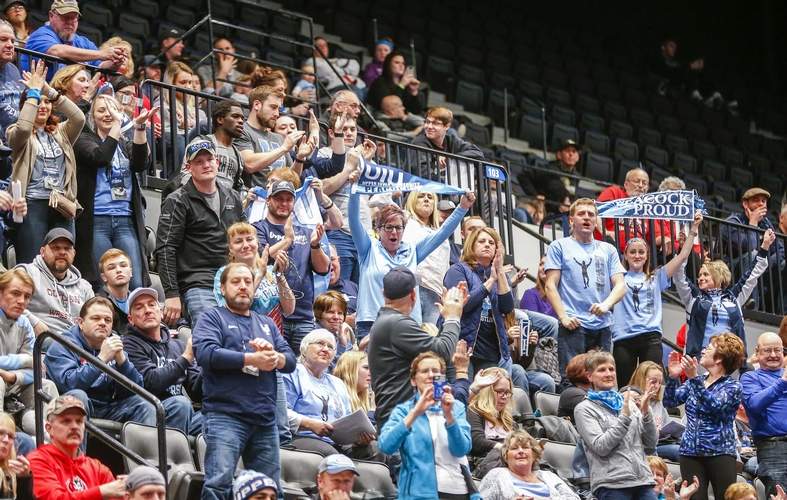CREDIT: Sports Engine / Nancy Justis / Jim Slosiarek
I wasn’t looking forward to it, but I knew eventually I would meet her — that crazy youth sports mom acting immature and unsportsmanlike in the stands.

I have seen others. Those who yell at the refs, try to coach their own kids, berate the coaches.
But this one was particularly unflattering.
It was at a fifth-grade travel basketball game. It was the semifinal game with the right to advance to the championship. It was a very tight game. She didn’t like the way the referees were calling the game.
You know the facilities. More than one game is being played at the same time. The sidelines and end lines are very close to the spectator areas. She was sitting behind one basket.
A player on my grandson’s team was given the opportunity to shoot free throws more than once, more than twice. In fact, quite often. He made most of his shots.
One time, when Josh stepped to the free throw line, this mother of an opposing player, one of the best players on the opponent’s team, said well within ear shot:
“Come on Josh, make your 25th free throw” in a very taunting manner.
My daughter had had enough. She stood up, turned to the other mother and said, “You can yell at the refs and coaches if you want, but you don’t ever get to yell at the kids. Ever.”
People in the stands shouldn’t ever yell at the coaches and referees, either, but the point was made.
The next time Josh stepped to the line, the mother said, “Sorry, Josh. I guess we can’t cheer for you. Make your free throw.”
Sarcasm did not become her.
A past sportsmanship survey by Liberty Mutual Insurance Responsible Sports found 50 percent of parents and coaches believed sportsmanship had worsened since they were growing up and 75 percent of parents and coaches felt teaching sportsmanship was the responsibility of parents. While more than half of coaches had experienced parents yelling negatively at officials or their own kids, and two in five had experienced parents yelling negatively at other kids, less than a third had confronted parents about bad behavior.
Fred Engh, founder of The Alliance for Youth Sports, gave three reasons for parental bad behavior in an article in allprodad.com.
1. Fear their kid won’t succeed. This parent is overly protective and tries to create an environment where his kid always wins. A deep fear that failure and loss will crush the spirit of the child which drives him to lash out.
2. Feeding their own ego. This parent lives vicariously through the child. Maybe he got cut from every team and is looking to compensate. Perhaps he was the star and craves the attention he once had. Sadly, he will cause his kids to hate sports and maybe even resent him.
3. Greed for the money. He thinks his kid is the golden ticket to financial wealth. Maybe a college scholarship or a future in professional sports.
So how do we combat unsportsmanlike behavior by youth sports parents?
In Alberta, Canada, Hockey Calgary tried something new — “sending the parents back to school.” At least one parent from every family of youth hockey players had to complete a 70-minute online course on respect and sportsmanship.
Psychologist Shane Murphy provides other tips for how parents can model good sportsmanship for their children.
— Cheer for all the children, even those on the other team (minus the sarcasm). “Parents who shout and cheer for all the children set a great example for the kids, by sending the message that youth sports are about giving one’s best effort and enjoying the game, not about winning and losing.”
— Talk to parents of the other team. They’re not the enemy. “Sometimes we get so caught up in an in-town rivalry, or a big match against another school, that we forget that the other team is really just like our kids. Their parents care about their children just as much as we do. Showing our children that we can interact with parents from the other team in a friendly manner sets a good example for them to congratulate or commiserate with the other team after every match.”
— Be a parent, not a coach. “Many of the most successful athletes I work with share something in common: their parents’ lack of criticism of their sporting performance. ‘They just wanted me to play and have fun.’”
Parents play a critical role in setting the tone and displaying good sportsmanship. Parents should “work hard to not be ‘that dad’ or ‘that mom’ who loses their cool,” Liberty Mutual noted in a PlayPositive posting.
“While you think the spotlight is on the field, it’s actually on you in the stands in the eyes of your children. They see and hear it all … walk-the-walk.
“Try things like ‘no verbs cheering’ where you only clap, wave your sign, whirl your rally towel … No verbs helps you steer clear of coaching from the stands or criticizing your child or any others.”
Nancy Justis is a former competitive swimmer and college sports information director. She is a partner with Outlier Creative Communications. Let her know what you think at [email protected]
